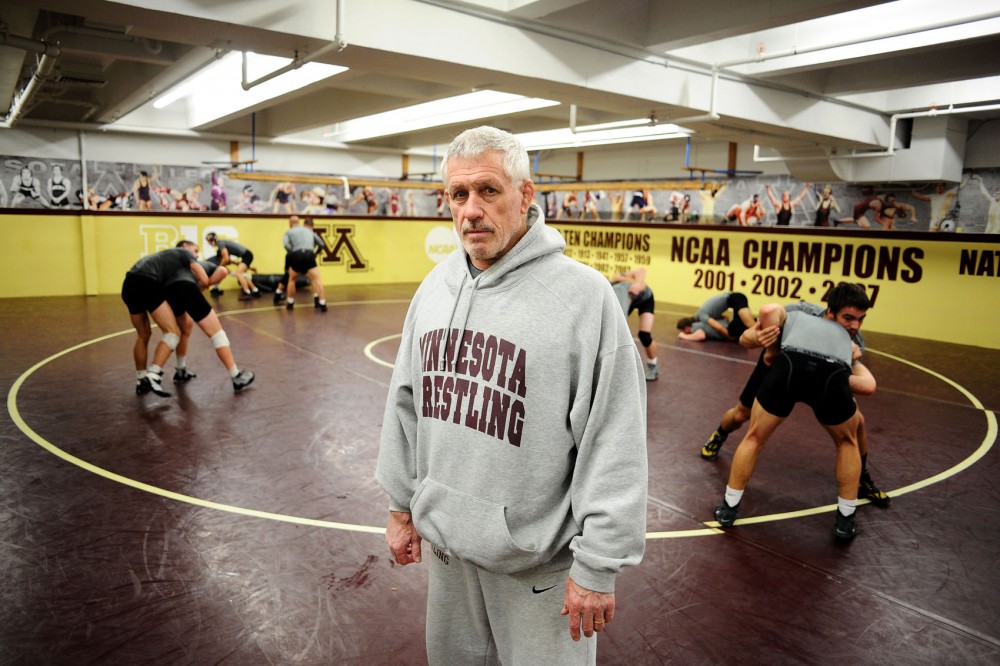J Robinson’s first wrestling team didn’t win a single dual.
Almost 27 years later, the Gophers head wrestling coach has tallied 388 wins and is still going strong.
On Thursday, he will have a chance to reflect on his own storied career, one that has been marked by innovation and controversy.
Robinson will be inducted into the University’s M Club Hall of Fame — a fitting honor for a man who has won three national championships and three Coach of the Year honors in his 26 years at the helm of Gophers wrestling.
One of nine inductees, Robinson said former athletics director Joel Maturi told him the news in May. Caught off-guard, Robinson said the award was something he never thought was possible.
Now that he’s had time to think about it, Robinson is grateful to receive the honor.
“When you win something that you can share with other people, I think that’s the biggest thing of all,” he said.
He will be joined at the event by his wife and children, along with former wrestlers with whom he has maintained relationships over the years. Three wrestlers from his 1986-87 team, his first at the University, will attend the ceremony.
Chad Kraft, Minnesota’s first four-time All-American wrestler, will be inducted alongside his former coach.
The M Club Hall of Fame is a combination of the men’s and women’s hall of fames. Created in 2003, it honors the achievements and preserves the traditions of the athletes, coaches and athletics staff members who have contributed in “an outstanding and positive way” to the University’s athletics department.
George Adzick, director of the M Club, said Robinson was selected for his excellence as a coach.
“He is one of the best wrestling coaches in the country, perhaps even all-time,” he said.
A 10-12 person selection committee met in February and March to select the induction class. The process included the M Club board of directors and the athletics department.
Tom Moe, men’s athletics director from 1999-2002, said he valued Robinson’s discipline and work ethic.
“J Robinson was a terrific coach and leader,” he said. “There were more kids on that team that got a mold you like to see in every athlete.”
Moe said the wrestlers who came from Robinson’s program were highly motivated and supportive of one another.
He added that Robinson was a strong-willed coach who wanted the best for his program.
Perhaps more importantly, he was reliable.
“When he told you something,” Moe said, “you could count on him.”
A champion’s mindset
Robinson has two absolutes that base his outlook on life: “life is difficult” and “you can outwork 90 percent of all Americans.”
Driven by his desire to achieve excellence, Robinson has become the most decorated wrestling coach in Minnesota history.
In his 26 years with the Gophers, he has coached three national-championship teams, six Big Ten- championship teams and 57 All-Americans. His 388 dual-meet wins are second-best in school history — four behind his predecessor Wally Johnson.
Robinson won his latest of three Coach of the Year honors in May after he led the Gophers to a Big Ten dual-season championship and a second-place finish at the NCAA championships.
He’s come a long way from that first season in 1986-87, when his team didn’t win a single dual. One night after losing a match to Michigan State, when his final wrestler blew a four-point lead, he made his team practice in the opponent’s gym.
Afterward, as he walked toward one of the two cars that would take the team away from the anger and frustration on the mat, Robinson noticed all 11 wrestlers getting into the other car.
“There’s four in the back seat, there’s three [more] of them stacked across like Lincoln Logs in the back seat,” he said, laughing. “There’s nobody with me.”
Though the first year was difficult, it laid the foundation for Robinson’s ultimate goal as a head coach: to make his athletes the best they can be on and off the mat.
“I think the greatest thing you can do in your life is to change someone else’s life for the good,” he said. “It has more reward than pretty much anything.”
Controversies
Robinson’s career has been peppered with controversy.
In 2010, the University investigated whether Robinson bought and sold real estate with former wrestlers and whether the sales were used as a recruiting incentive.
The report said Robinson did not violate NCAA rules.
Robinson has also openly opposed Title IX, the part of Equal Opportunity in Education Act of 1972 that enforced equal participation opportunities in college sports for men and women.
In 2001, he proposed changing the language of the law to state that no men’s programs could be eliminated to comply with Title IX.
In a 2007 Minnesota Daily article, he criticized the quota systems that emerge at institutions because of Title IX.
He said it would be better to provide programs and opportunities to men and women based upon their interest in a sport rather than the fixed goal of a 50-50 division of resources.
Set in his ways
Robinson said his purpose is to coach wrestling and change lives.
“My purpose is to plant seeds,” he said. “I’m not here to sit under the shade of the trees I plant.”
His communication with his athletes hasn’t changed over the years.
“My standard is pretty much the same,” he said. “We’re here to win and to try as hard as we can. We’re here to establish excellence.”
Though Robinson’s style has contributed to his success as a coach, it can be challenging to work with.
Senior wrestler Cody Yohn, a three-time NCAA qualifier, said he doesn’t always see eye-to-eye with Robinson, but the two respect each other and can resolve their differences.
Yohn cited an example from a practice this week.
“He told me, ‘I don’t care if I piss you off. I’m going to make you a national champion.’”








